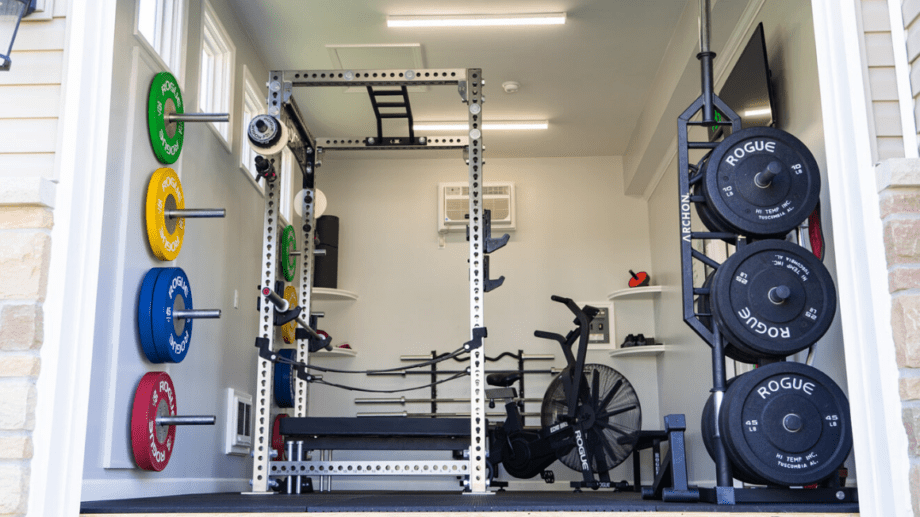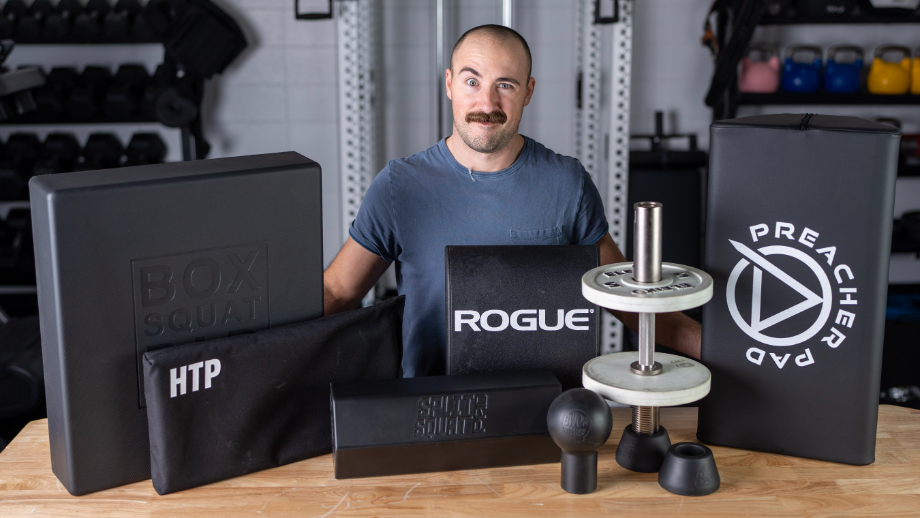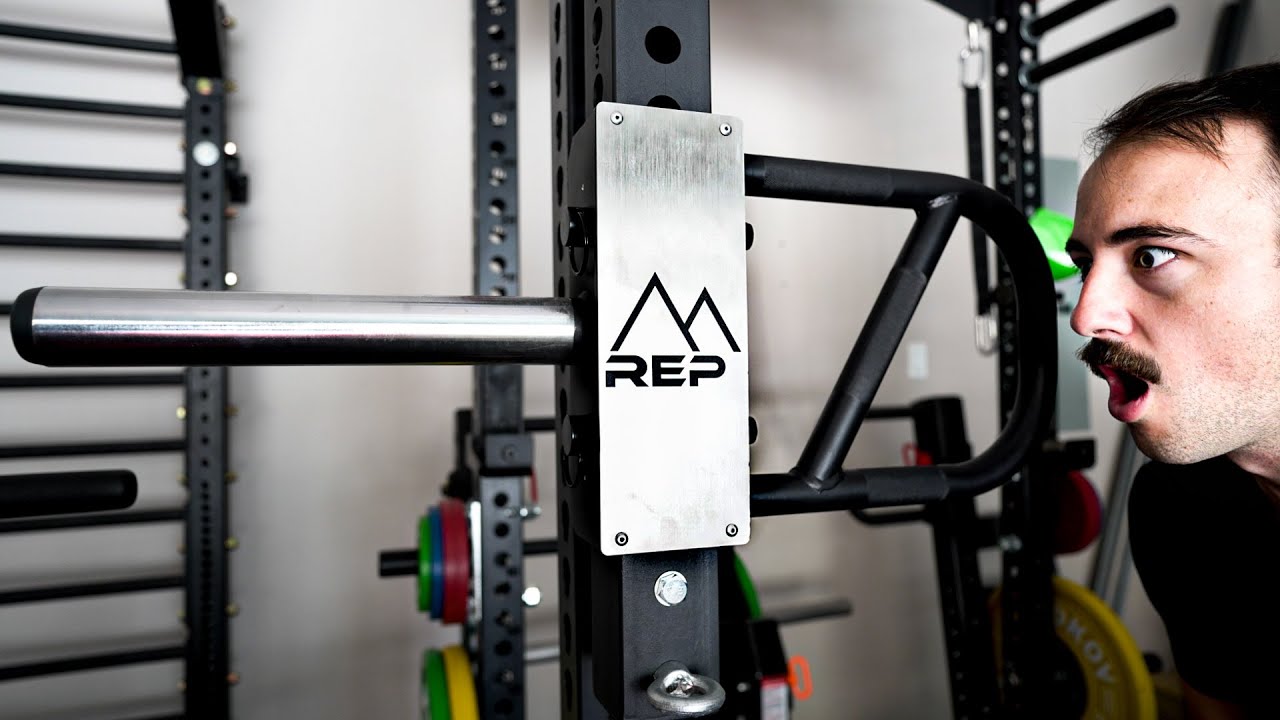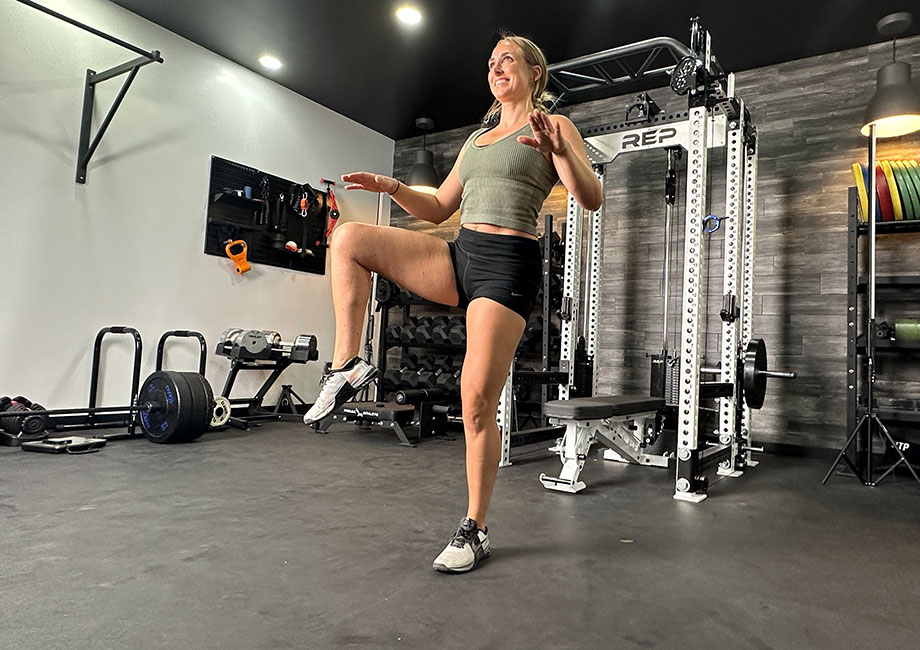The squat rack is the centerpiece of nearly every home gym. In our Ultimate Squat Rack Guide we cover your most asked questions on power racks and give our recommendations at various price points.
The almighty power rack. Many a man has entered, but few have left without getting bigger, stronger, or faster. In this guide, our goal is to answer the questions you have on squat racks as well as provide basic recommendations from various companies. We have used, arguably, a wider variety of racks than anyone else in the industry. This includes pretty much the entire rack lines from Rogue Fitness, Rep Fitness, Titan Fitness, Sorinex, Hammer Strength, Cap Barbell, EliteFTS, Fringe Sport, and many others, including lesser-known brands like Prime Fitness. There are an insane amount of squat racks available for purchase today, however, not all are with your time or money. Let this be your ultimate squat rack guide.
If you’re looking for more comprehensive squat rack recommendations, check out our guide on the best squat racks.
The History of the Squat Rack
Barbells, dumbbells, a bench press, and a squat rack. There are many other important machines and exercises, but those four things are found in nearly every weight room in America (at least one that we would consider a weight room.) The squat, in terms of popularity, function, and importance is one of the three most important lifts in weight training. If you ask anyone, even if they have never lifted a weight in their life, they will know the bench press, the squat, and the deadlift.
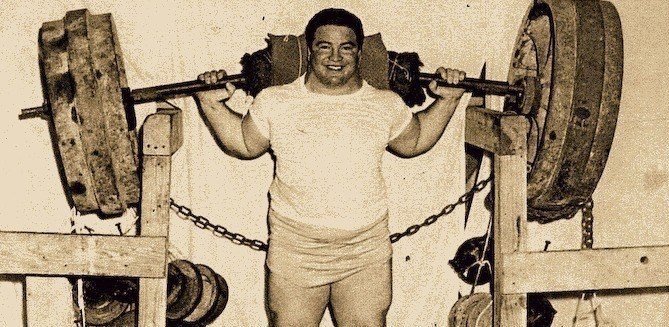
With the rise in popularity and importance of the squat, the power rack has become a centerpiece in any home gym, health club, and all of the CrossFit gyms that seem to be opening daily. The great thing about the squat is that, while form is important, it is just you against the weight and that all starts with the right rack. There are so many choices today from power racks to squat stands and everything in between that it can be difficult and overwhelming when deciding which one fits your needs.
RELATED: Best Home Gym Machines
The history of the squat rack is tied to the history of the exercise connected to it…the squat. As late as the early 1900s, the exercise that we call the squat today was actually called a “deep knee bend.” Because the squat rack had not yet been invented, hoisting heavy weight onto the shoulders was too difficult and the deep knee bend was often done with lightweight and a lot of reps.
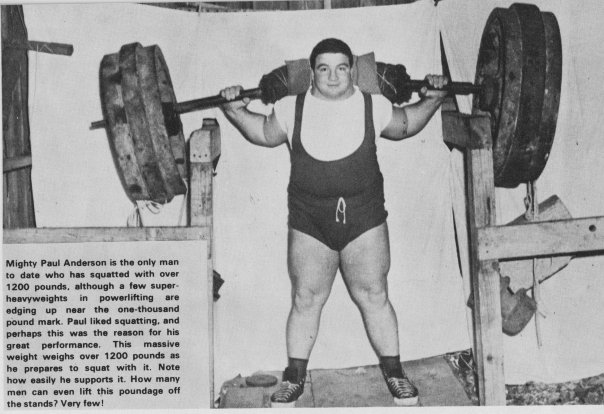
Not only was the exercise called something different, but it was also actually performed differently as well. The lifter would often stand with their heels together, toes pointed out, and knees at about a 45-degree angle from the body. With knees and toes pointed out, the lifter would bend their knees to the point that they were virtually sitting on their own heels.
A 1921 copy of “Strength” magazine is widely credited with the first usage of the word “squat” to describe a weightlifting exercise. Henry Steinborn, a German immigrant who came to America after World War I, was featured in this magazine and is widely credited as the inventor of the modern squat. When other lifters saw that Steinborn could lift heavier weights this way and without injury, the squat almost overnight became a common lift both in gyms and in competitions.
The squat, however, without a squat rack was a pretty difficult exercise. To lift the weight onto their shoulders, many lifters would perform a clean, partial press, and allow the weight to pass over their heads and onto their shoulders. For heavier weights, some lifters would place the Olympic barbell perpendicular to the floor and try to allow the weight to slide onto their shoulders while standing up which was also quite difficult. This is the method that Steinborn himself made popular.
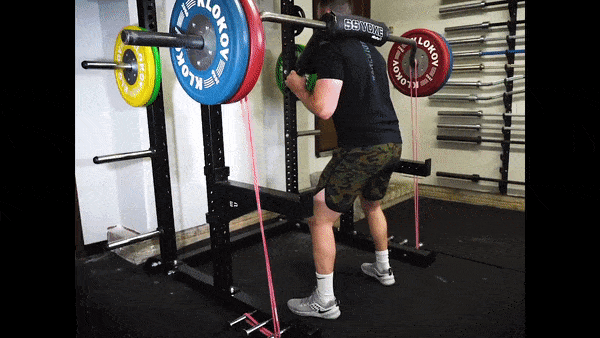
The squat rack, like many great inventions, came about out of necessity as much as anything else. As the back squat gained in popularity and heavier weights were being used daily, something had to change.
The squat rack became a prominent piece of fitness equipment in virtually all commercial weightlifting gyms by the 1930s, just a few years after the rise of prominence of the squat. Over the years there have been steady upgrades of the initial squat rack.
Today’s squat rack is most often seen in the form of a power rack. No longer just a single function piece of equipment, the power rack acts as a squat rack, bench rack, spotter, and has many other functions as well. Today’s power rack provides safety to lifters of heavier weight as it stops the weight from falling past a certain point no matter how heavy the lift. This added safety and flexibility have made squat racks the center of most weight rooms from garage gyms to large chains.
Why You Should Own and Use a Squat Rack
The squat is the preeminent lower body lift no matter if you are a powerlifter, Crossfitter, or a person who is just trying to get in better shape. The squat aids in overall strength and is a functional lift as well.
If you are squatting correctly it should also be one of your heaviest lifts (some squat more, others deadlift more, few bench more.) You should be able to squat more weight than you can lift during overhead presses which means that owning a squat rack is a must for any gym from a commercial gym to your garage. A squat rack allows you to load weight on all types of exercises while the bar is in a position to make the lift and thanks to its high weight capacity if it’s heavy-duty, it should. Prior to the squat rack, lifters had to use a variety of less effective exercises with lower weights because the logistics just were not there. You should own a squat rack because it allows you to make heavy lifts from a comfortable position which allows you to make gains in strength and functionality.
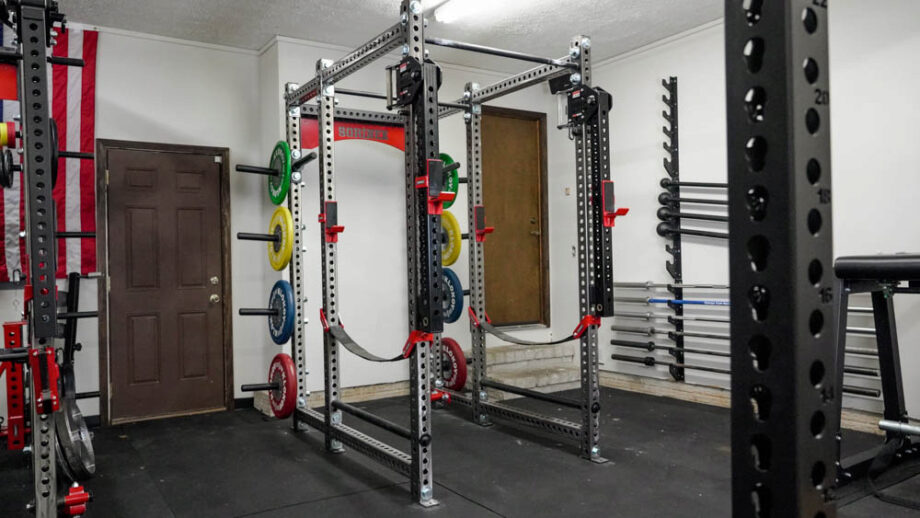
Not only is a rack, also known by many as a squat cage, great for squats, its versatility also allows an insane amount of other movements to be performed. Rack pulls are a favorite and one reason you should buy safety bars (another is so you don’t get hurt while performing the bench press alone.) You can add a dip station to racks extremely easily via removable dip bars. If you want to work the muscle groups in your back, many racks actually allow you to add a lat pulldown to the back to increase your pulling strength.
RELATED: Squat Rack Exercises
On top of the logistics of a squat rack, as new gym equipment is built to meet new demands, the product keeps getting better and safer. Today’s squat racks almost always include the flexibility to do numerous exercises and the safety to perform those exercises in the comfort of your home gym.
What to Look for in a Squat Rack
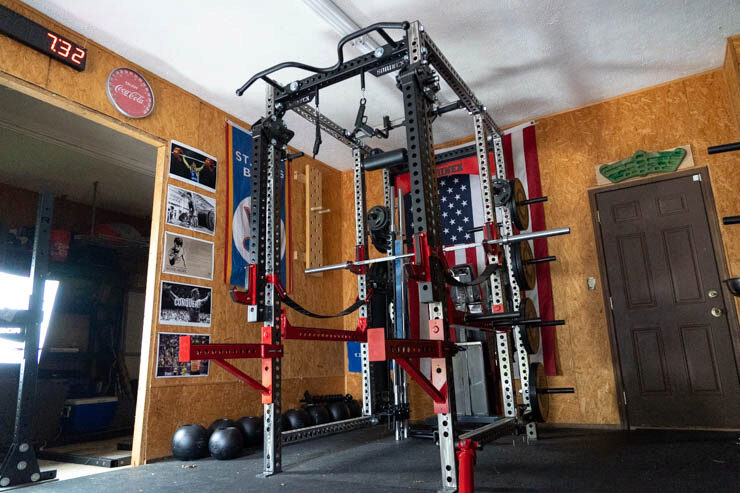
The first thing to look for in a squat rack, no matter the quality, features, or flexibility, is the size of the rack. If the rack will not fit in the floor space that you have or it is too short or too tall, then it is not the right rack. Many people will get so involved in the options and features of a rack that they waste their time looking at products that they’ll never be able to use. Focus your time and energy on researching those racks that fit perfectly into your space and for the height of the people who will be using the rack. You should measure out the floor space that you have to work with, and then, and only then begin researching racks.
The next thing to look for in a squat rack is the quality of the machine. There is a different quality and standard for commercial racks as opposed to personal racks. You should also consider the amount of weight and frequency of use that the squat rack will see. But do not only plan based on how much you lift now, plan based on how much you want to lift three, five, and even 10 years from now. A squat rack, due to the nature of the build quality, is designed to last for many decades. This isn’t a cell phone, it’s a frame of steel. Quality is important and it gets even more so the more often you use the product.
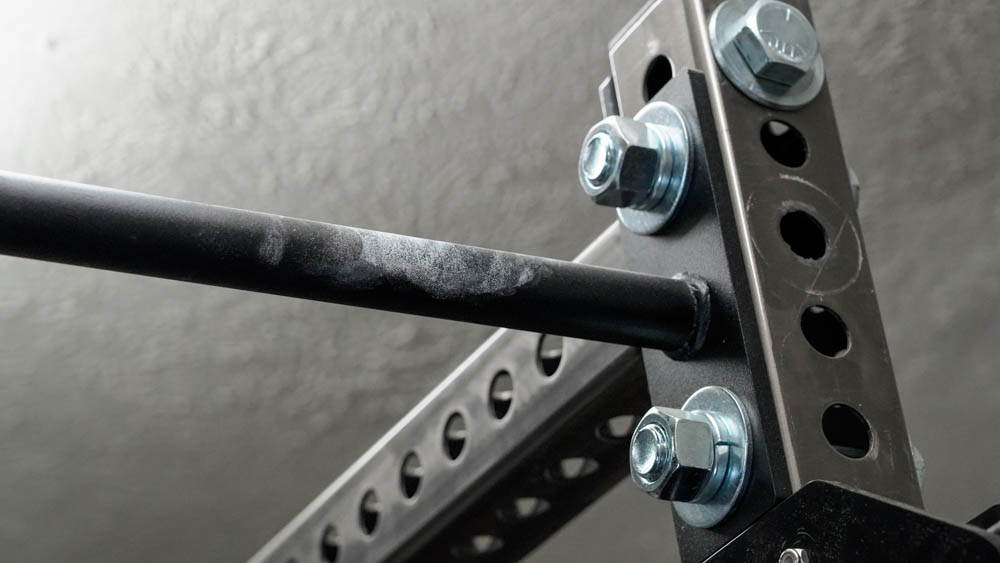
When deciding on the quality of the rack, something to consider is the type and thickness of the steel that was used in manufacturing. Generally, you can expect the more inexpensive racks to have 2”x2” steel and the higher quality and more expensive racks to go all the way up to 3”x3”. While the size of the upright is important, the gauge can often be an even more important indicator of price and quality. A few racks will use 7-gauge steel which is very thick and reserved generally for commercial use, and to be honest, completely overkill for even the strongest in the world. 7-gauge steel is virtually indestructible. The more likely scenario for a home or garage gym purchase would be 11-gauge steel. This is strong enough for almost any home gym scenario and will probably last you a lifetime.
It is important to look for the gauge of the steel and not to purchase anything less than 12-gauge. If it is not listed as a selling point, for instance, if you are purchasing from Walmart or Amazon, then it is probably a lower gauge steel and not worth purchasing. While 7-gauge is overkill for a home gym, less than 12-gauge is potentially dangerous depending on how much weight you lift.
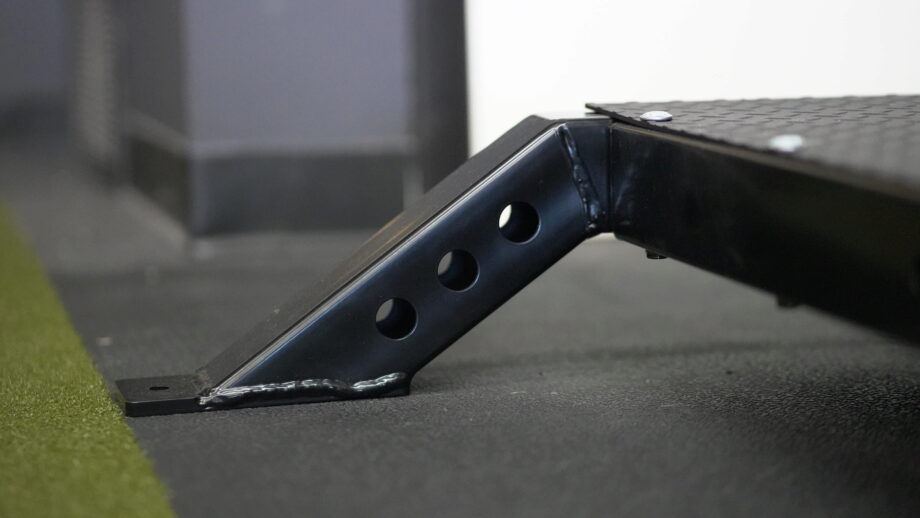
Aside from the thickness and gauge of the steel, there is one more aspect of quality craftsmanship when it comes to a squat rack. Because it is made out of steel, welding plays a large part in the construction of the machine. A good weld can be the difference between a machine that lasts two years and a machine that lasts a lifetime. The difficulty in knowing if the welds are good has nothing to do with the aesthetics of the welds (a good weld should look like a stack of dimes in a row) and everything to do with the structural soundness that the welds provide.
Many reviewers will tear down the quality of a machine based on how the welding looks, but the key to the quality of the machine rests in whether or not the welds do their job. Titan Fitness, for instance, has been known to have some very ugly welds that have lead to equipment failures. Be aware that you often get what you pay for.
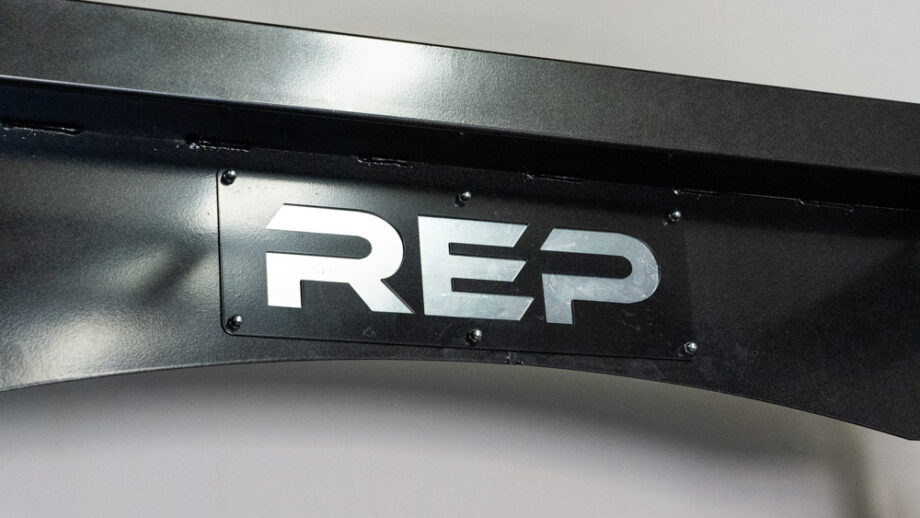
You should also consider the brands that offer squat racks and decide if one gives you more confidence than others. There are high-level brands like Rogue that produce high quality at a high price, mid-level brands like REP Fitness and Fringe Sport that are considerably cheaper and maintain high quality, and then lower-level products like Weider that are considerably cheaper but are not viable for heavy lifters. When considering the brand, make sure you look at warranties, reviews, history, and price to see which one fits you. A review of different racks will come later in this article.
Another consideration for a squat rack is the ease of use associated with the machine. While there are a few things that can make a squat rack easier or more difficult to use, the key is how easy the safety bars are to adjust. When moving from one exercise to another, you do not want to have to wait and break up your momentum to fidget with a machine that is too difficult to adjust and operate. When researching, and before buying, make sure that one of the pros associated with the squat rack is that it is easy to use and more specifically easy to adjust. Otherwise, no matter how great the rest of the features are, you will spend your time frustrated with the rack.
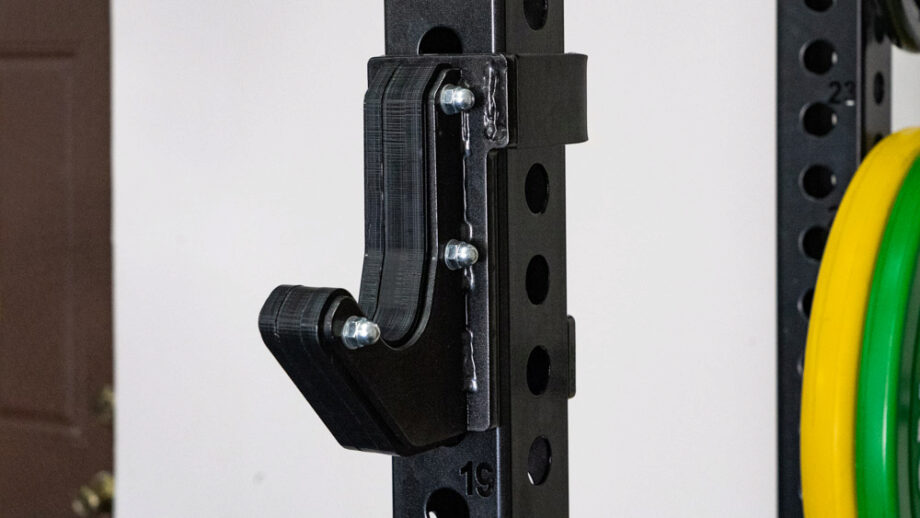
There are also safety features that should be considered and researched. For instance, can the rack be anchored to the floor? Is it compatible with J-cups? Is there a stabilizer and if so is it in the way and potentially dangerous to the lifter? The truth is, the safety provided by a squat rack is probably its most important quality and should be considered over almost any other feature when purchasing a rack. The most important thing to look for in terms of safety is that the safety bars can be adjusted to the levels that you need them to be. A squat rack can be used as a “spotter” of sorts and can allow you to lift heavy weight safely even in the absence of a spotter. While less important, you should also know if the rack can be anchored to the floor or if it is sturdy enough on its own and if you need a stabilizer and if so where it is located.
A key advantage to today’s racks is that most of them provide versatility in terms of how many exercises they are built to. For instance, many of today’s power racks have the capacity to be a squat rack, bench press, lat pull, pull up, dip machine, and many others all rolled into one. When purchasing your rack, it is important that you decide which exercises are important to you and which ones you can either do without or accomplish with a different piece of equipment. Of course, the more exercises that a squat rack can accommodate, the more expensive it will probably be (see our review of the Prime Fitness Prodigy Rack for instance.) So, be realistic and be ready to spend more money if you want your rack to be more of an all-in-one machine. Also, pay attention to the accessories that are available for each squat rack. There are many machines that do not come equipped with everything that you need to do every exercise but inexpensive and effective accessory pieces may be available for purchase.
While this consideration is similar to some of the others mentioned above, it is important enough to have its own paragraph. Holes are inserted into each squat rack so that the safety pins that hold an Olympic barbell can be placed at different levels. When it comes to holes, the first consideration is the type of hole. Many of the less expensive racks have holes that are punched directly into the steel, and while this will suffice, it can also bend the steel and cause issues down the road. The better and more precise way to create holes in your rack is through laser cuts that do not negatively affect the structural soundness of the rack. While this can cause an increase in the price of the rack, it is an important addition.
Check out our guide to the best budget home gym equipment.
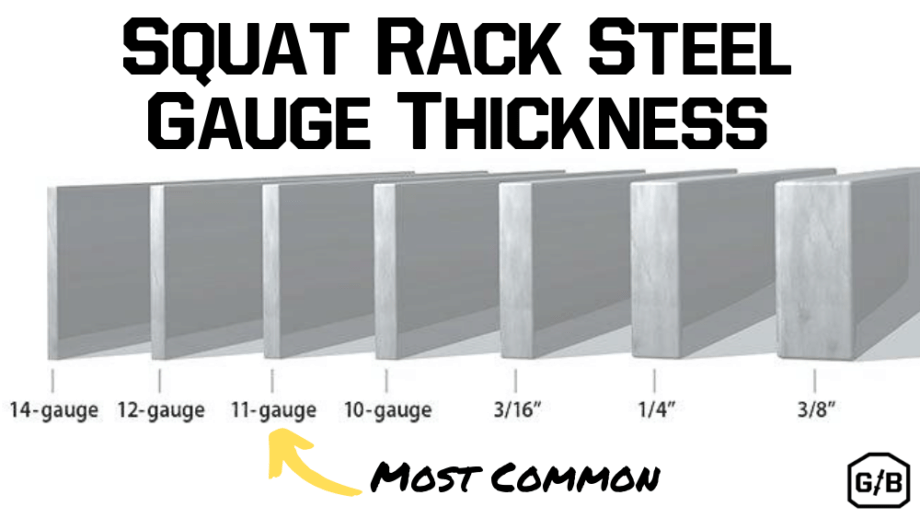
After the type of holes, the other main issue is to research the spacing between the holes in each rack. Many racks will give you 2-inch spacing between holes throughout the machine and with no exceptions. This has always been the standard, and for the majority of lifters, that is fine. Newer power racks have moved to what is known as Westside Hole Spacing which was developed in a partnership between Rogue Fitness and Westside Barbell; it is now copied by nearly everyone in the industry. This gives the user either 1-inch spacing throughout the machine or a combination of 1 and 2-inch spacing depending on the hole’s location. This new spacing gives you the ability to be more exact in your J-hooks, safeties, and any other accessories and can make a big difference depending on the exercise.
Many new racks have weight plate storage built directly into them as well. While storage trees are relatively inexpensive, having plate storage on a machine that is already in the gym can be a big space saver and increase the stability of the rack. This especially applies to home and garage gyms where space can become an issue quickly.
One of the most important things you will want to consider, especially if purchasing a power rack, is the accessories that are offered and/or compatible with the machine. Accessories like pull up bars, lat pulls, J-hooks, dip station, weight storage, and band pegs for adding resistance bands. Most of these accessories are self-explanatory, and if you are looking to purchase a rack you know that accessories are important. With that said, you should definitely consider purchasing additional j hooks so that you can have more than one exercise ready to go at any time.
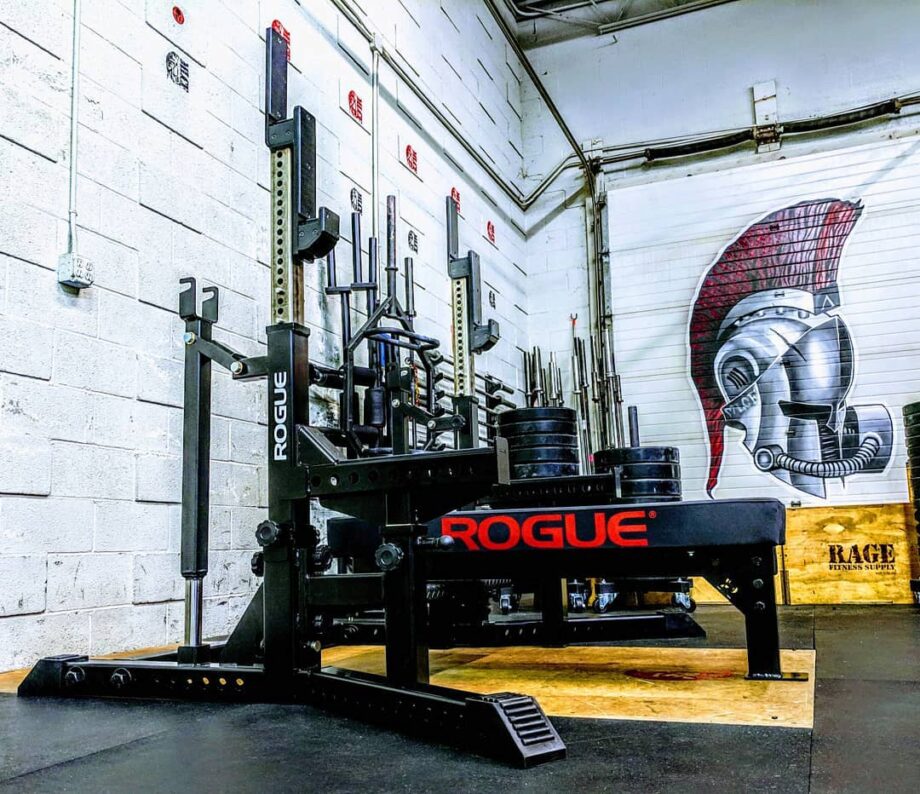
In addition to the actual functionality of the squat rack, you should also look at which racks have the longest warranty, the cheapest and quickest shipping options, and how easy it is to assemble. Warranty information is always listed on the companies site, but in general, the more expensive the equipment, the longer the warranty. What is really key is the ease of assembly. If the machine is very difficult to put together or has a lot of different steps in assembly, then it also has a greater chance of not being put together correctly. The best thing you could do is either pay for assembly, purchase an already assembled product, or be prepared to be very attentive during the assembly process.
RELATED: Best Folding Squat Racks
The frame style is the last consideration we see as important in selecting a rack and will be discussed in greater detail in the next section. The important thing to know is that there are thousands of options to research and become familiar with when purchasing a squat rack, and the type of rack is the first thing you should figure out. There are power racks (what we suggest), squat stands, fold-away racks, and others and figuring out which suits your desire is the first thing you should do.
The 5 Squat Rack Types
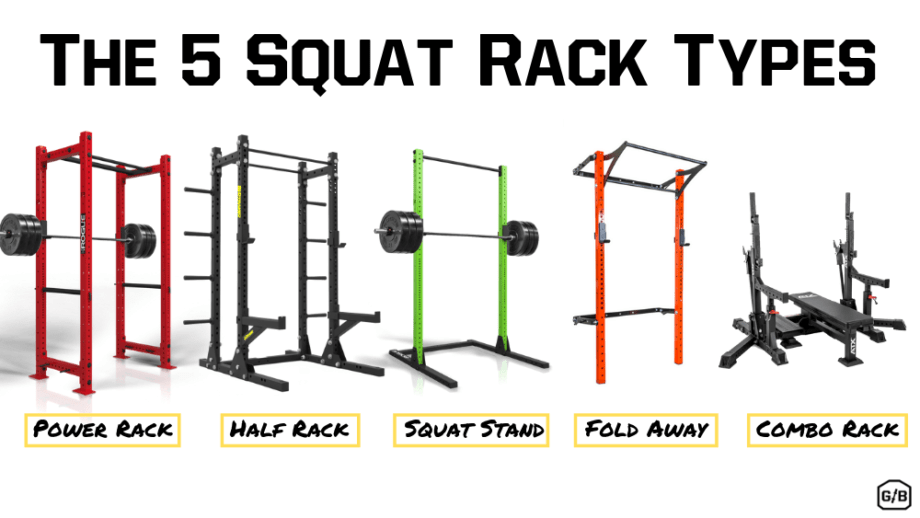
1. Power Rack
The first and most often recommended type of squat rack is the power rack. Many of the safety features and accessories mentioned above are specific to the power rack. Also known as a squat cage or power cage, a power rack is a piece of weight training equipment that offers a lifter the safety of a “mechanical” spotter, the versatility to perform numerous lifts, and the freedom to work out with free weights all alone. A power rack is often called a power cage because it looks like an animal cage that has lost most of its bars. While the power rack is great for safety, ease of use, variety of exercises, and is, in general, the best type of squat rack for a serious lifter, there are also some drawbacks. The power rack takes up the most space, lacks portability, and is usually the most expensive rack on the market.
Despite these negatives, for most people training in a garage or home gym, we suggest a power rack for the versatility and safety offered.
2. Half Rack
The main difference between the half rack and the power rack is the size and the number of exercises that can be performed. In fact, the half rack is essentially just a smaller version of a power rack for people with less space and shorter ceilings. The half rack is a considerably cheaper option, but the flip side is that you the versatility of a full power rack is greater. Half racks, as a general rule, do not match the capabilities of the full power rack, however, they’re often cheaper and are great for people who don’t like to feel enclosed when they’re lifting.
3. Squat Stand
The squat stand is basically an open power rack. Taking away that much of the power rack also takes away all of the safety features and versatility that the power rack offers. While it is smaller and generally cheaper than a power rack, a squat stand does not compare to the features offered on a power rack.
If you plan to use a squat stand, we can’t stress enough the need for using spotter arms when training alone.
4. Fold Away Squat Rack
The fold-away squat rack is the perfect invention for the lifter who both works out and parks in their garage (yes, not everyone enjoys street parking.) The fold-away squat rack does exactly what the name suggests, it folds away almost flush with the wall on which it is mounted. For anyone who is really short on space but still wants the ability to perform squats and other exercises, this machine is perfect. It folds almost completely out of the way when not being used, and while it is a specialty item, there is definitely a market for this type of machine.
5. Combo Rack
The combo rack is a specialized squat rack designed to be used in powerlifting meets. Featuring a bench that locks in as well as adjustable uprights, although a combo rack can be used in a home gym, it’s honestly best suited for powerlifting gyms or meet events. Since this is a newer type of squat rack, there are a lot less companies selling them than the other types of squat racks. However, despite there not being a lot of competition in this area, there are some great designs.
If you focus on the squat, deadlift, and bench and want to use similar equipment to what you’ll end up using on meet day, then this is a great option.
Squat Rack Safety
High-quality squat racks already have a few safety features, like spotter arms and safety pins/straps. You should also ensure your squat rack is stable and secure before lifting, whether bolting it to the ground or wall or using weight plate attachments to hold it in place. That said, pay attention to the weight capacity, as an overloaded rack is also in danger of tipping.
GGR’s Senior Director of Content Kate Meier, NASM-CPT, USAW-L1, CF-L1, covers all this and more in her comprehensive guide to squat rack safety.
The Best Rogue Fitness Squat Racks
Rogue Fitness is best known for making high-end gym equipment, designed to outlast the user, and make a statement in their garage gym. Although originally, their target audience was CrossFit, it’s since morphed into powerlifting, Olympic weightlifting, and bodybuilding users.
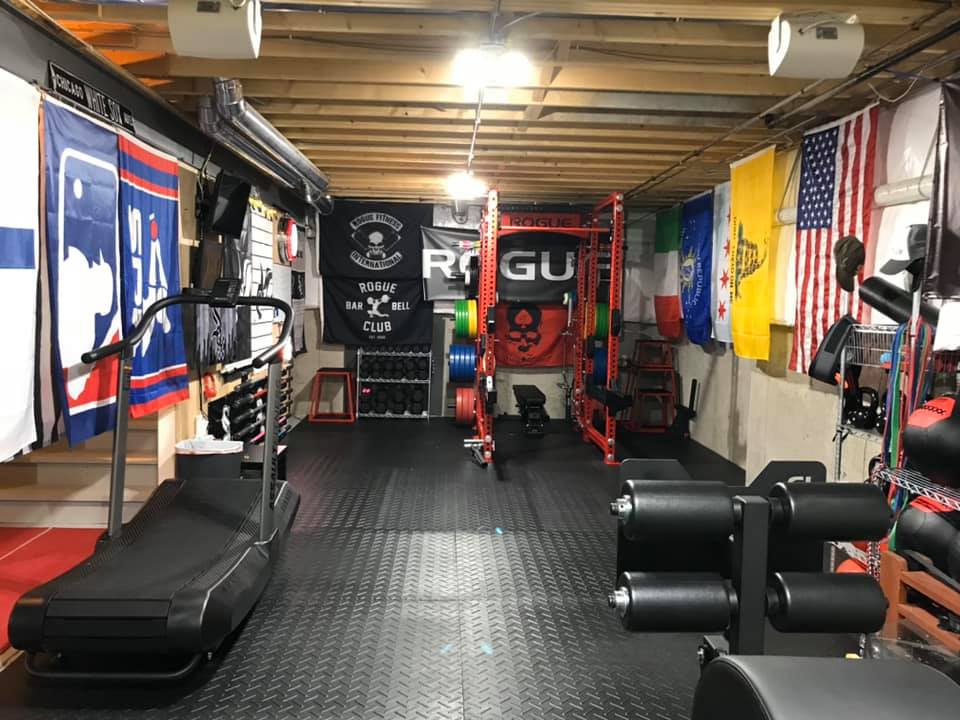
Here’s our general take on Rogue: If you like the finer things in life, notice details, enjoy products made in the USA, want something you’ll never have to worry about, and want to buy from a company who not only has a bullet-proof warranty, but also will be around to service it for decades to come, then Rogue is for you.
If most of those things don’t matter to you and you’re more looking for a similar level of functionality at a lower price, look at some of their imported competitors. The weight capacity and overall functionality should be similar, although there will be some differences in things like powder-coat, J-cups and other attachments.
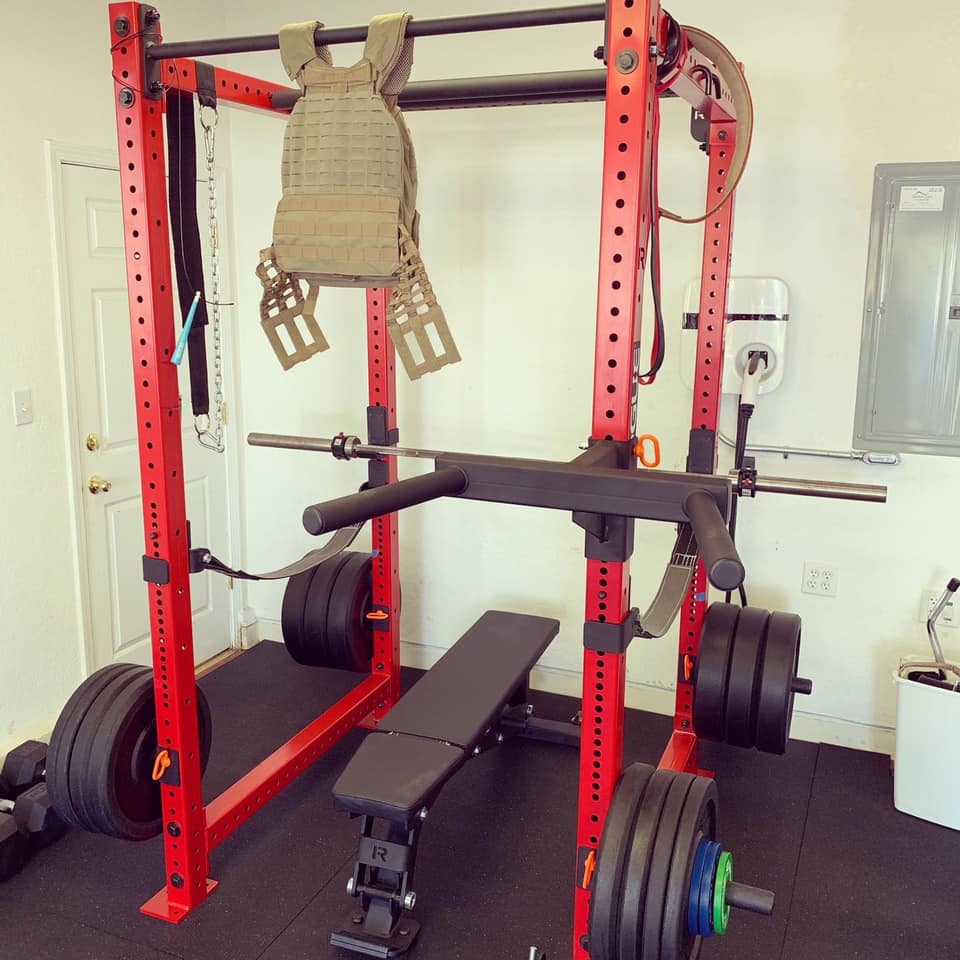
For most people, the line of racks we suggest is the Monster Lite Line. Previously, we suggested the Infinity Line, but Rogue hasn’t been putting as much R&D into this line and therefore new product announcements are typically centered around the Monster and Monster Lite Line.
All of the ML Series Line from Rogue feature 3″x3″ Racking Uprights, 11-gauge steel sourced from 100% US Mills and most often include a chin-up bar on the rack. For a home gym, these are ideal, especially for those that want a lot of versatility and upgradeability without taking up too much floor space.
Best Rogue Power Rack
Rogue Froning RML-4100C Power Rack
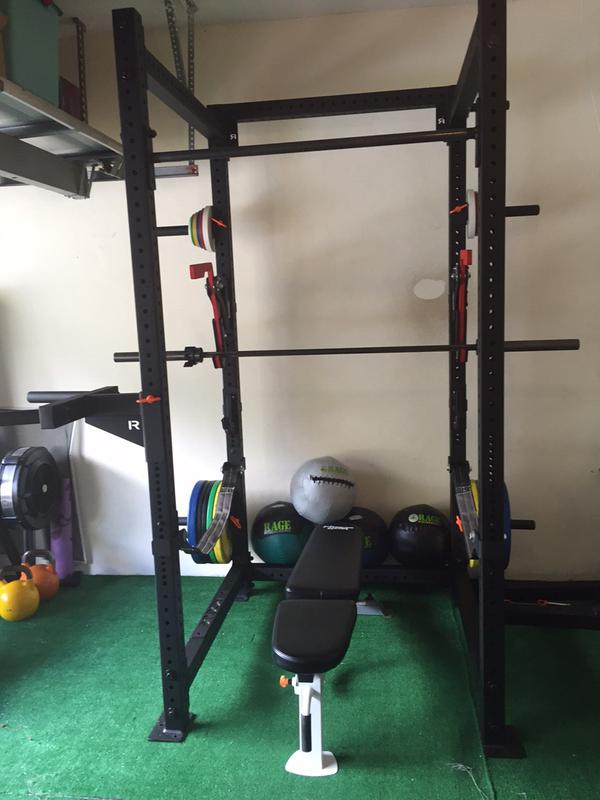
Product Highlights
With the exclusive Froning Edition RML-4100C Power Rack, the Rogue team set out to create the ultimate, tailor-made CrossFit rack–featuring all of the unique elements preferred by the four-time CrossFit Games champion himself.The American-made RML-4100C shares the same core, Westside-inspired design as our RML-490C Color Racks–3×3" 11-gauge steel, 0.
Pros & Cons
Bottom Line
The Rogue Rack we’d recommend to most of our readers is the Rogue RML-490C Power Rack 3.0. This is actually an updated version from their previous racks that now come in various colors, laser-cut numbered uprights and have a ton of attachments from multi-grip pull-up bars to jammer arms. Another benefit of the RML-490C is that due to its width, it doesn’t need to be bolted to the ground to prevent it from shaking or falling over.
Most Compact Rogue Rack
Rogue RML-3WC Fold Back Wall Mount Rack
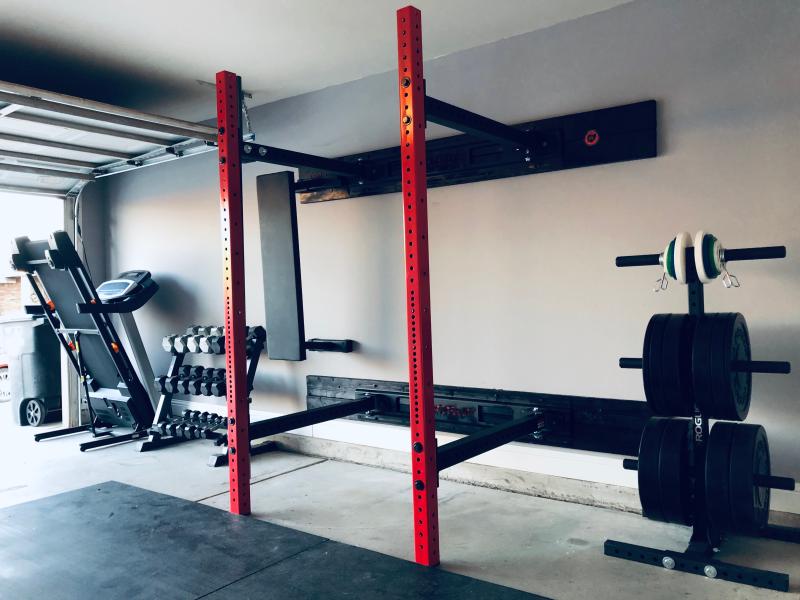
Product Highlights
The Rogue Custom Color Fold Back Rack includes all the features of our original retractable Monster Lite RML-3W Power Rack, with the added ability to select your own color finish for the unit’s 90.375" uprights.
Pros & Cons
Pros
- The Rogue RML-3WC Folding Squat Rack is likely Rogue’s best selling squat rack (it has almost twice the amount of reviews as any other rack.)
- Featuring a rotating hinge system, the RML-3WC is able to fold away when not in use making it great for a garage gym that still wants to have access for a car to park or a home gym that wants a rack that goes out of the way.
- The 3WC version differs from the RML-3W only in that it is available in various powder coat colors. Everything else is the same.
- The uprights of the rack are made of 3″x3″ 11-gauge steel that is the same as what’s used in Rogue’s highest-end line, the Monster Series of racks.
- Due to the standard sizing of the uprights and a â…” hole size, the RML-3WC can use all of the Monster Lite line of accessories as well as those from other companies like Titan Fitness and Rep Fitness that use a similar geometry rack tubing.
- When unfolded, the rack is far enough away from the wall that the weight plates as well as your head won’t feel uncomfortable when squatting or benching.
- A pull-up bar comes standard with the rack which detaches when not in use and adds stability when in use.
- As with all Rogue Squat Racks, this is made entirely in the USA of US-sourced steel.
- Rogue has developed a laser-cut stringer system that makes installing the rack pretty easy and looks much better than a DIY wood stringer.
- The j-cups are rated for 1,000+ LB, and thanks to the weight being pretty close to centered on the upright, there isn’t a ton of stress placed on your wall studs.
- No need to bolt it into the floor, which saves your concrete foundation.
Cons
- As with most Rogue racks, this isn’t the cheapest folding squat rack available.
- Due to what is required to fold the rack away, we’ve noticed that many people end up leaving the rack unfolded, which defeats the purpose and the extra expense that’s paid for a folding squat rack.
- Although folding away so the rack is out of the way is superior to a stand-alone rack for those with space considerations, a rack that folds up is an easier and quicker mechanism because no disassembly is required. For this reason, we recommend the PRx Performance Profile Rack if you can stomach the extra cost.
Bottom Line
The Rogue RML-3WC Fold Back Squat Rack is a very popular, space-saving squat rack for home gym owners. In our review, we’ve found the RML-3W to be an excellent folding rack, if you plan to actually disassemble the pull-up bar and fold it away. If not, then we suggest getting a stand-alone rack due to increased versatility. Regardless, this rack has the typical level of quality we’ve come to expect from Rogue at a fair price for made in the USA equipment.
If you’re low on space, or just want the ability to easily park in your garage without sacrificing functionality, then the Rogue RML-3WC Fold Back Wall Mount Rack is ideal. Although our favorite folding rack is the PRx Performance Pro Rack, it is quite a bit more expensive than fold-away options and requires additional ceiling height to install. The fold back racks from Rogue are designed to fold out when in use, and folded back into the wall when no longer needed.
We prefer the RML-3WC over Rogue’s other fold away racks due to its upright size and color options. A pull-up bar comes standard with the rack, it has westside hole spacing as well as custom laser-cut wall stringers that not only look good, but are incredibly well functioning (they also have a black textured powder coat finish.) If you CrossFit, you’ll appreciate the rigidity of the rack, even for kipping pull-ups or toes-to-bar and if you lift alone, spotter arms work just as well as any of their other racks.
Best Budget Rogue Rack
Rogue HR-2 Half Rack
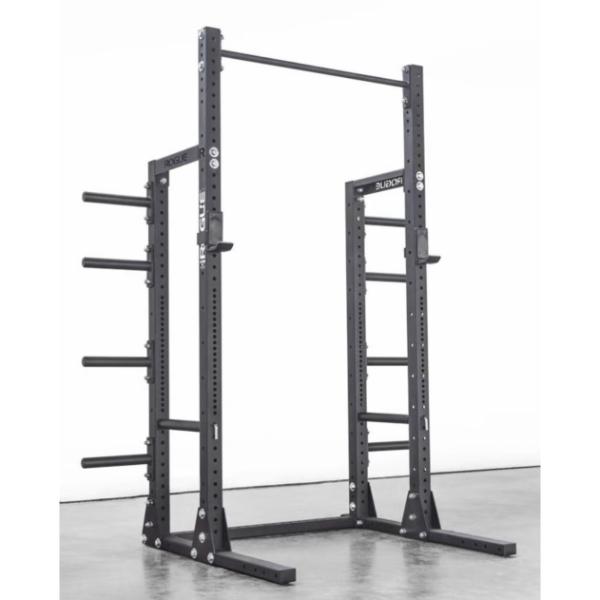
Product Highlights
- Great storage capacity
- No need to bolt down
- Has a pull-up bar
Pros & Cons
Pros
- Doesn’t have to be bolted to the ground
- Extremely stable
- Customizable height options
- Has a single “skinny” pull-up bar
- Priced around $800
Cons
- Base is made of weaker steel
- Pin safeties cost extra
Bottom Line
The Rogue HR-2 Half Rack is one of Rogue's best-reviewed squat racks. It's a great rack that can fit anywhere, doesn't have to be bolted down, is still very stable, and has a majority of the abilities of a more expensive and bulkier rack like the ever-popular Rogue R-3 Power Rack.
If your budget is a bit tighter than the previously recommended racks allow, but you’re set on a Rogue rack, I suggest the Rogue SML-2C Squat Stand. This is actually the first squat cage I ever had for strength training in my home and that I reviewed and despite having it for nearly six years and putting it through all types of torture, it still looks and performs pretty much like it did on day one (sans some powder coat chipping that’s to be expected.)
Again, the SML-2 features all of the same steel construction as the aforementioned racks as well as a built-in chin-up bar that’s great for all sorts of bodyweight movements and can be used as a DIY Lat Pulldown.
The Best REP Fitness Squat Racks
REP Fitness has been around since 2012, but has only recently started to become a household name among the Garage Gym Community. Despite importing nearly all of their equipment from Power Cages to Olympic Barbells, Rep has high levels of quality control and offers a great value.
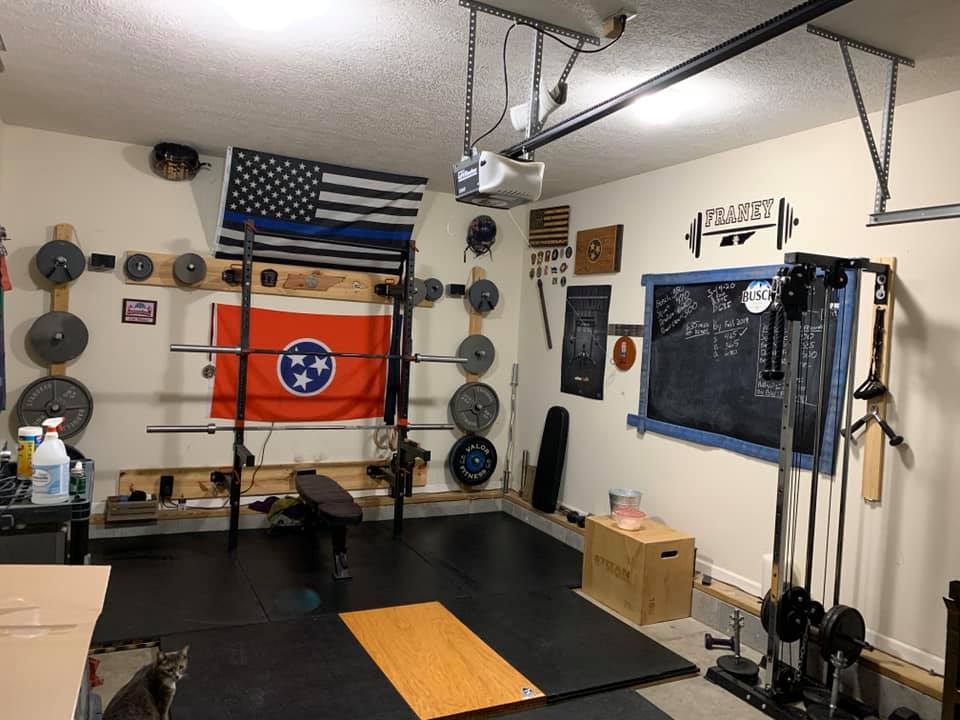
Although they have quite a bit smaller of a product selection than Rogue, they do have some racks that we recommend a whole lot.
Best REP Fitness Power Rack
REP PR-4000 Power Rack
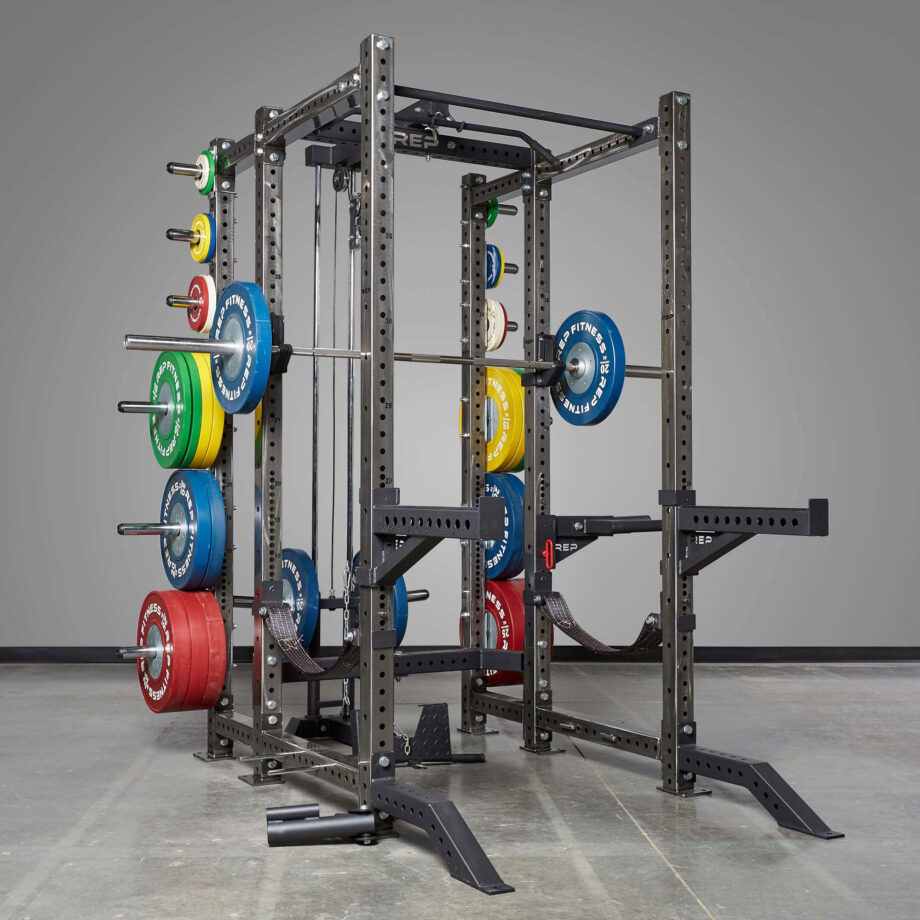
Product Highlights
- Heavy duty 11-gauge steel
- 3″ x 3″ uprights
- Rated for 1,000 lbs
Pros & Cons
Pros
- Affordable, high-quality rack
- Several color options available
- Laser-cut holes and logos
- Uprights are numbered every 5 holes
- Westside hole spacing
- Can be built out to include weight storage, pull-up bar, strap safeties, etc.
- 3×3-inch 11-gauge steel
Cons
- Accessories for the PR-4000 and PR-5000 racks aren’t as good as the competition
- Some of the welds and powder coating aren’t up to par
Bottom Line
The Rep Fitness PR-4000 Power Rack is honestly one of the best value power racks on the market. This rack has garnered excellent reviews from us and others and it's largely due to how great it's features are for the price point. This is still a pretty expensive rack for those on a tight budget and trying to build a home gym, but this is the type of rack you never have to upgrade. Is it better than the Rogue Monster Lite? No, but it is cheaper and very similar quality, although it is imported. We are big fans of the PR-4000 and recommend it.
Although we would love to recommend their HR-5000 Half Rack, you can see a full review of it here, or their PR-5000 V2 Power Rack, both of these are out of the price range for most people. The cage we would like to recommend though is the REP PR-4000 Power Rack. It’s essentially an imported version of the Rogue Monster Lite Series of racks and as such, has a great price point, yet has the ability to use all of the trimmings like safety bars for Olympic bar work, plate storage for all the best bumper plates and other attachments for optimal strength training.
Best Budget Rep Fitness Rack
REP PR-1100 Home Gym Power Rack
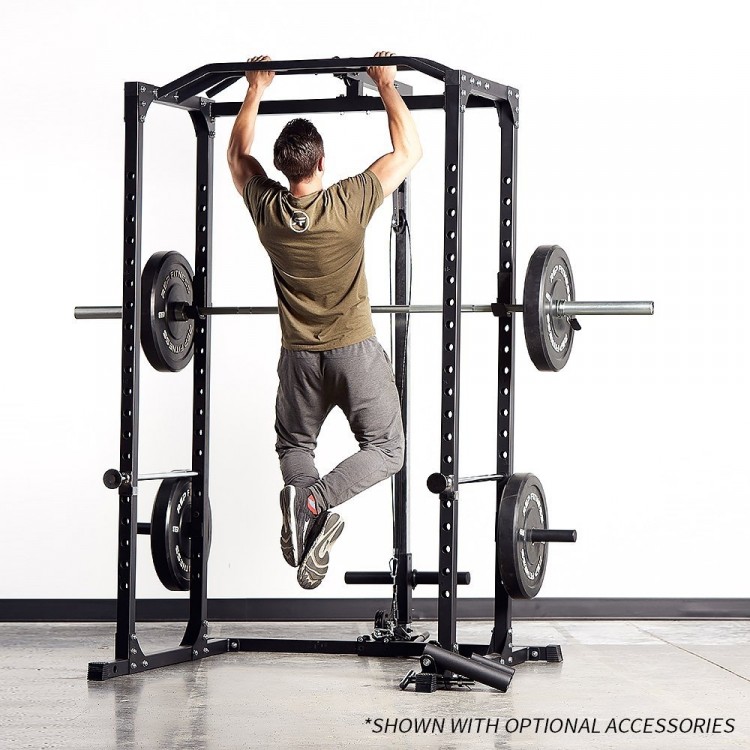
Product Highlights
- Rated at 700 lbs
- Designed for home and garage gym owners
- Has professional features
- Compact and versatile
- Multi-grip pull-up arch
Pros & Cons
Pros
- Good balance between value and versatility
- Shown to exceed durability and weight capacity expectations
- Budget-friendly
- Has different color options
- Multi-grip pull-up bar
- Flat-footed rack base
- Laser-cut numbers every five holes on uprights
- Plastic-lined J-cups
- Included chrome-plated safeties
- Ability to add attachments
Cons
- Competitors at this price range or less
- Assembly can take some time as it is largely bolted together
- 14-gauge steel
- 700-lb weight capacity
Bottom Line
The REP Fitness PR-1100 is, in our opinion, one of the best value squat racks on the market for those just starting a home gym or squat/bench less than 700 LB. In our review, we've found that this is a stable power rack with many features taken from racks twice its price. This includes upright color options, a multi-grip pull-up bar, UHMW j-cups, and numbered uprights. If you're trying to build a budget home gym, this is an excellent option, just be aware that you may want to upgrade in the future.
If you have a lower budget than the PR-4000 allows, then a rack with 14-gauge steel, yet a 1,000 LB weight capacity and a small footprint is the Rep PR-1100 which we often recommend. It comes with features not normal for the price point including numbered uprights, plastic-lined J-hooks, and a multi-grip pull-up bar. Although this rack isn’t nearly the level as some of the others recommended, it will get the job done and is a great one for a beginner.
The Best Titan Fitness Squat Racks
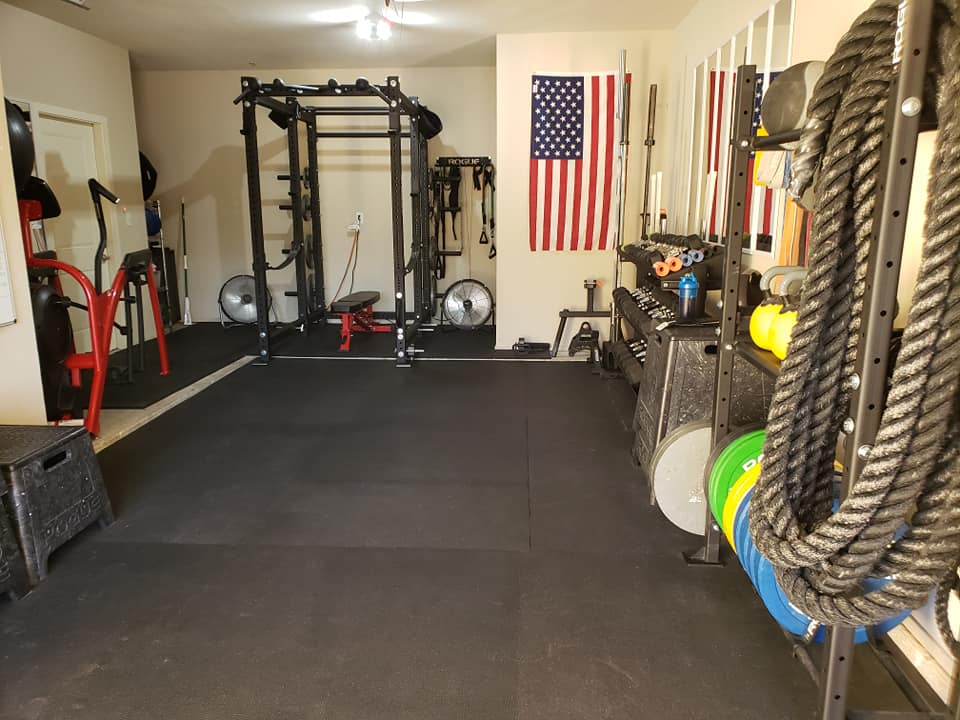
Titan Fitness is considered by many to be an imported Rogue clone. They use many of the same designs, colors, and even logo styles as Rogue, yet everything is much cheaper due to it being imported from China and other eastern countries.
Best Titan Power Rack
Titan T-3 Series Power Rack
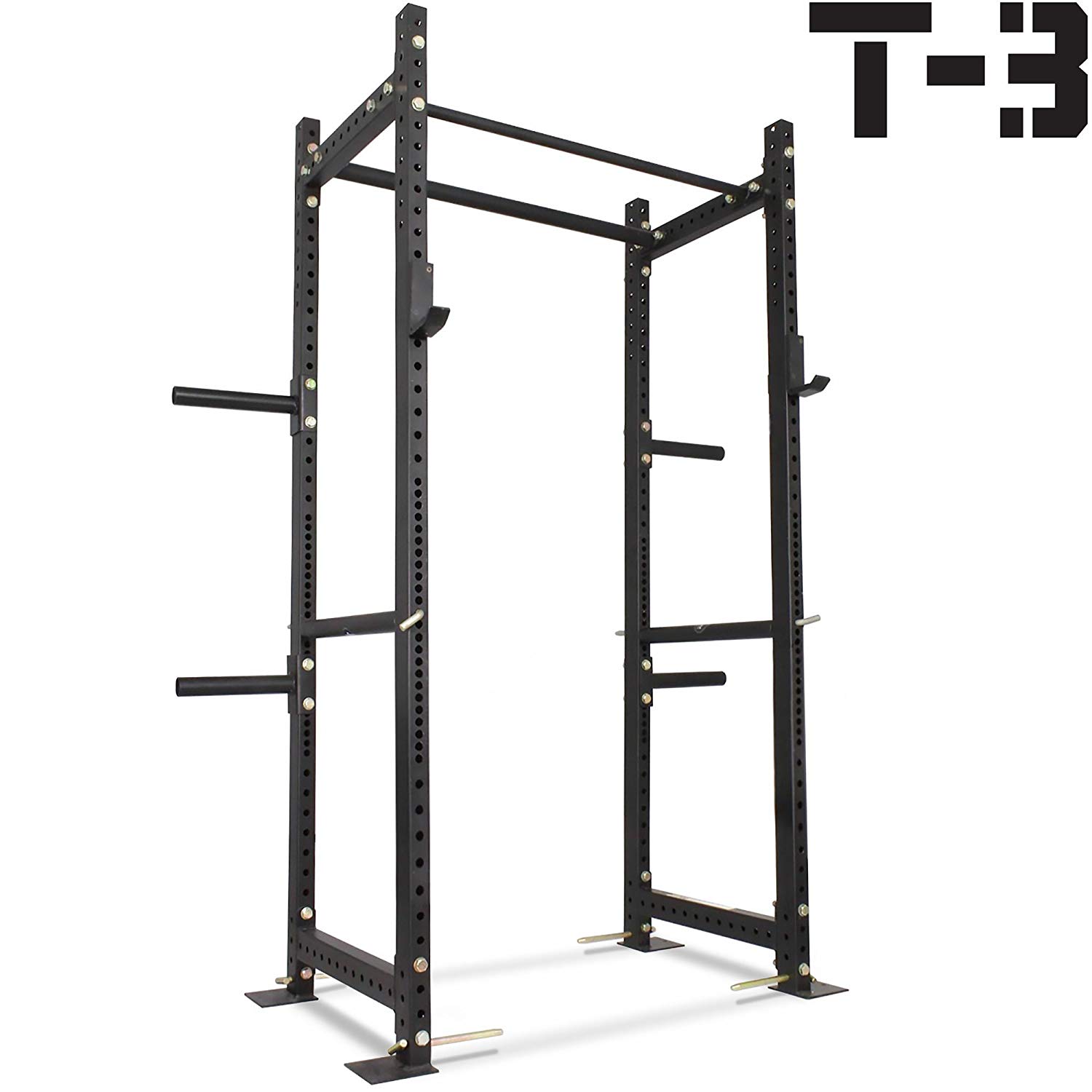
Product Highlights
- 2×3″ 11-gauge steel tubing
- Weight capacity of 1,000 lbs
- Westside spacing
- Bolt-together construction
- Includes J-hooks and weight holders
Pros & Cons
Pros
- More affordable than competitors
- Stable when bolted down
- Bolted panels easier to adjust on uneven surface
- V2 of the T-3 comes in a variety of colors
- V2 of the T-3 has laser-cut holes on the side and front of uprights
- Westside spacing
- Pin/pipe safeties
- 2×3" tubing allows for Titan and other competitors' attachments and add-ons
Cons
- Known for delays and mixing up orders
- Imported materials
- Not the best welds
- J-cups are average at best
- Bolted panels makes for a weaker joint
- Cheaper bolts used
Bottom Line
The Titan T-3 is a good, budget-friendly power rack. It's very similar to one of our favorite racks, the Rogue R-3, but at a much cheaper price thanks to it's imported nature. If you have the ability to bolt down your rack to a platform or concrete foundation and want a rack that won't break the bank, this is a good option.
The most popular Titan Rack is the Titan T-3 Power Rack that we actually compared to the Rogue R-3 here, and it fared quite well. It uses 2″x3″ uprights made of greater than 12-guage steel and laser-cut holes. They now offer colors on the racks and are overall a great value. It must be noted, however, that the racks must be bolted to the ground in order to be used. If you want something beefier, check out the X-3 Series.
Best Compact Titan Rack
Titan X-3 Fold Back Wall-Mounted Squat Rack
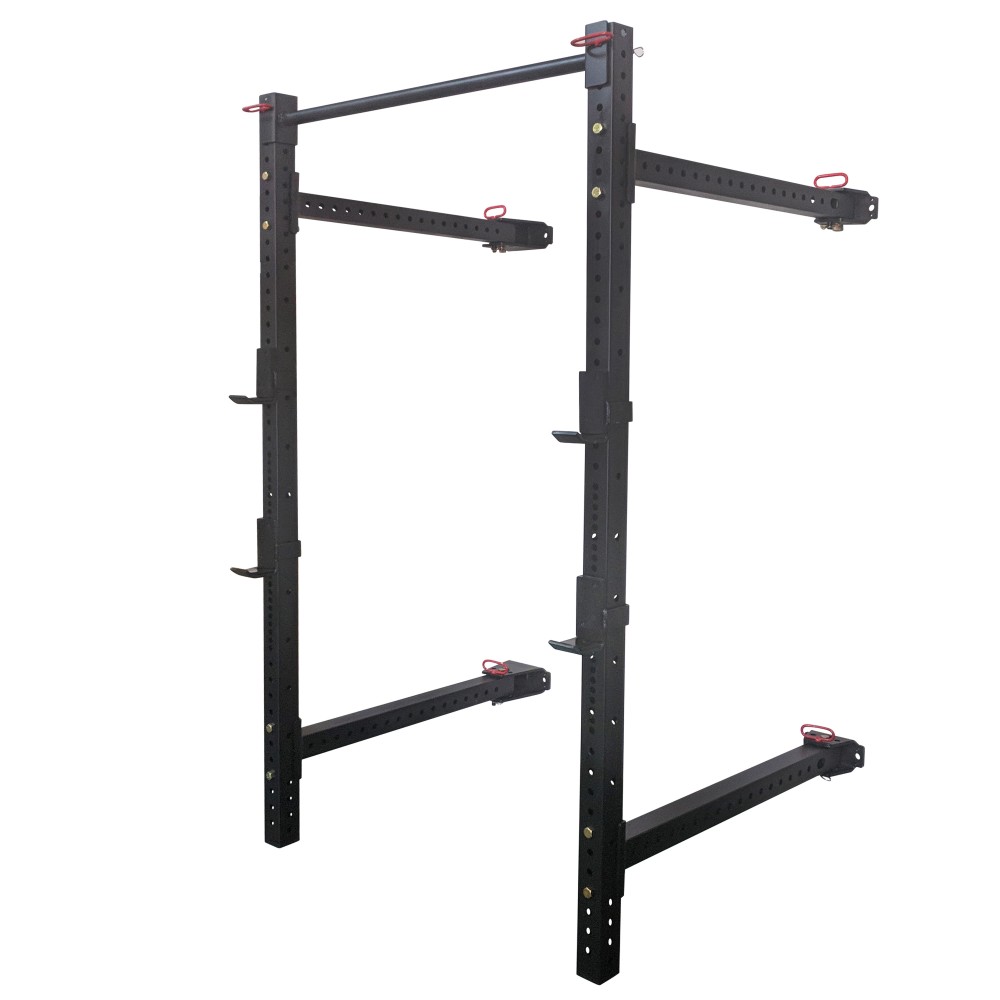
Product Highlights
The Titan X-3 Series folding power rack is ideal for anyone with limited space. Start bench pressing, doing squats, dips, and other creative exercises within minutes after installing the rack to your wall.
Pros & Cons
Bottom Line
If a foldable rack is desired, then the Wall Mounted X-3 Racks are what we’d recommend from Titan as they fold back allowing your car to fit in the garage. Another benefit is due to them being bolted to the wall, they are extremely sturdy, making them a great centerpiece for any gym.
The Best Squat Racks on Amazon
Although Amazon is typically known for lower quality exercise equipment, they do offer some great value racks.
The Fitness Reality 810XLT Super Max Power Cage is a decent rack that’s similar to the Rep PR-1100 that we’ve recommended, but with some other features and a low price with Prime Shipping. We’re not big fans of the j-cups or the fact that it’s not a walk-through rack, but other than that it’s not bad.
If you just want the cheapest rack on the market, then the CAP Barbell Power Rack Exercise Stand is what we’d recommend. It’s available in various colors, has a pull-up bar as well as plate storage on the back and has a weight capacity of 500 LB. Although this won’t be the last rack you buy, it is a decent option.
Squat Rack Guide: FAQs
What is the proper form and technique for a squat rack?
We asked GGR’s Senior Director of Content Kate Meier, NASM-CPT, USAW-L1, CF-L1, for her advice on proper squat rack form and technique:
Setting Your J-Hooks
To use a squat rack properly, you need to set the J-hooks at the appropriate height. The bottom of the hook—where the barbell rests—should hit at about your armpit height. Make sure the J-hooks are even before you put the bar in them. Sometimes, you won’t be able to tell until you place the bar in the hooks and see the bar is tilted; remove the bar and fix your J-hooks.
Racking the Barbell
To get the bar into the rack, pick it up with an overhand grip and place it on your shoulders. Walk the bar forward into the rack. With the bar on your shoulders and your feet squarely under you, bend at the knee slightly to lower the bar until it rests securely on the J-hooks.
Unracking the Barbell
To unrack the barbell, walk into the rack and bend your knees slightly to lower your body under the bar. Make sure your feet are squarely under the bar. I advise against having your feet in a split position because this is less stable than having your feet together. With the barbell placed on your shoulders in the front rack or on your back in the back rack, stand tall to lift the bar out of the J-hooks, then take one to two full steps away from the rack before performing any exercise. You’ll need enough distance between you and the rack to avoid hitting the J-hooks during movement.
What is the best depth for a squat rack?
“The proper setup for a squat rack is to ensure the J-hooks are set at a height that you can easily un-rack and re-rack a barbell. If you set the hooks too low, you’ll have to perform a squat to get the bar in and out of the rack, which is extra work. If you set the hooks too high, you’ll have to be on tip-toes to remove the bar, which can be dangerous, says Kate Meier, NASM-CPT, USAW-L1, CF-L1.
“The ideal placement for a J-hook is a height where the bottom of the hook is at your armpit height. This means you only have to bend your knees slightly to get the bar in and out of the rack.”
How do you rack weight for squats?
To rack a barbell in a squat rack, walk forward all the way into the rack so the bar is positioned directly above the J-hooks and your feet are squarely beneath you. Then bend your knees slightly to lower the bar onto the hooks.
“I always look left and right continuously as I do this to make sure the bar is over the hooks. This is especially true if it’s a free-standing squat stand, which isn’t as stable and can move if your barbell hits it,” adds Kate Meier, NASM-CPT, USAW-L1, CF-L1.
When you are confident the bar is resting in the hooks, bend your knees to get the bar off your body and step away from the rack.
Are squat racks suitable for beginners?
“Squat racks are great for beginners! They provide a stable place to rack and un-rack a barbell instead of having to pull a bar off the ground and find the ideal position on your shoulders or your back. I always teach beginners to properly rack and un-rack an empty barbell, having them repeat the steps until they are comfortable doing so. Once they have mastered getting in and out of the rack, they can begin adding weight to the bar (as long as the weight is safe for the movement they are going to perform),” says Kate Meier, NASM-CPT, USAW-L1, CF-L1.


